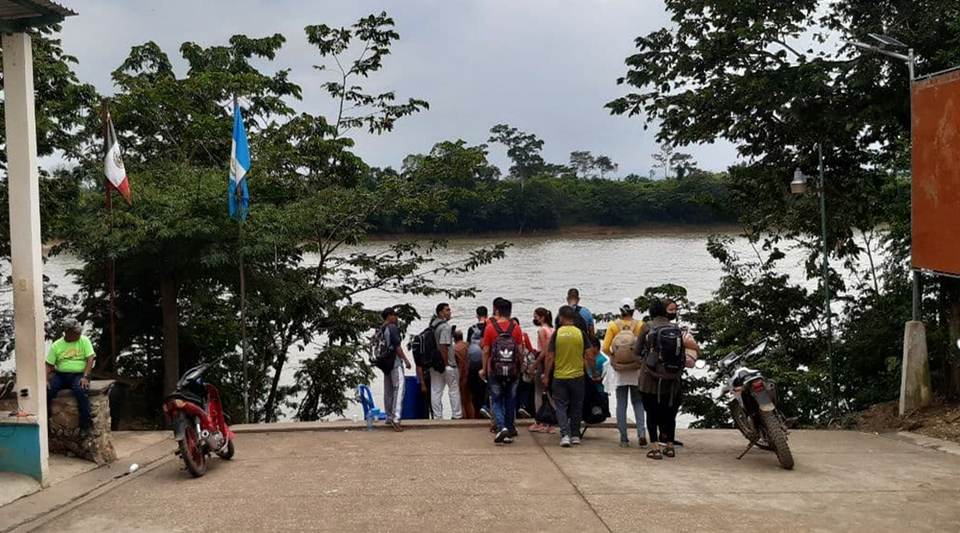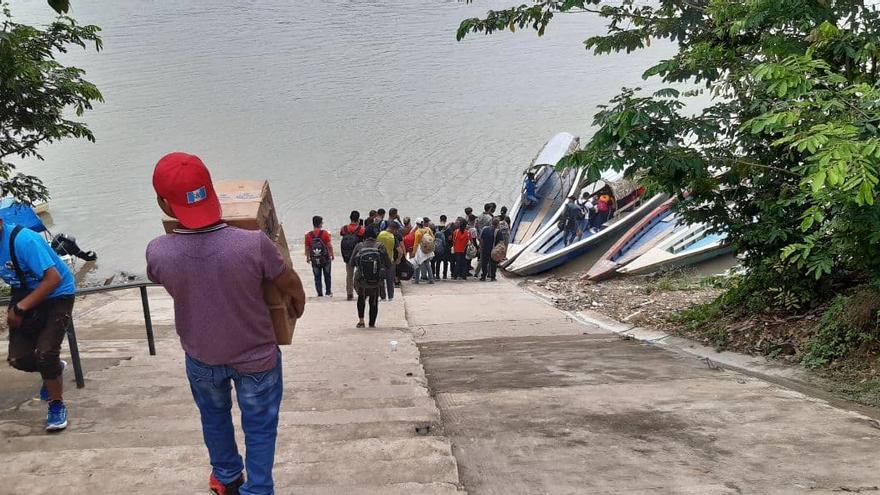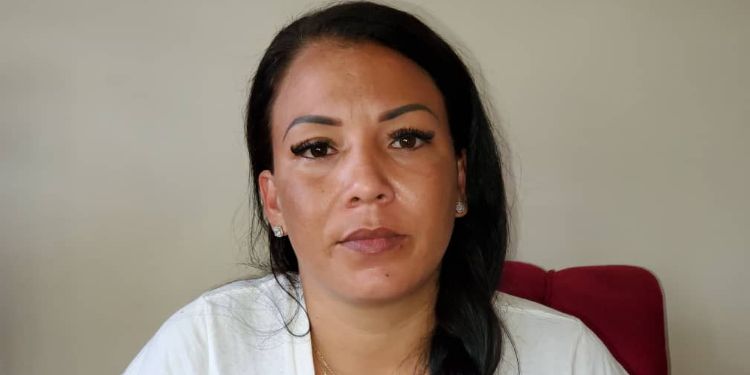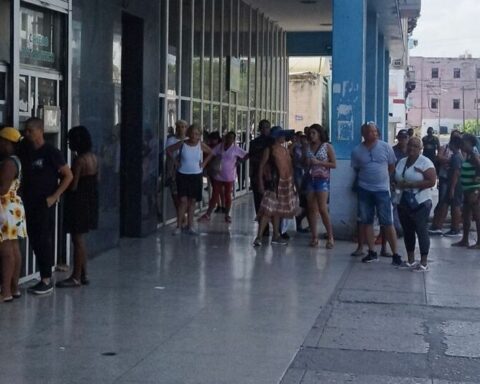In that little motel there were rooms and hammocks, which were outside, in the patio, and those with the fewest resources stayed there, sometimes women with children. Juan, the trafficker, would then say: “Come to the room, even if you don’t pay me, it doesn’t matter. Give them food, look for milk for the children, I’ll pay for it.” The man showed the gentle side of him from time to time.
There I also met three Hondurans, to whom I told the story of Cuba, emphasizing what had happened last year and since Díaz-Canel became president, and they said: “But how can it be? Why don’t you go to the streets?” And I explained to them: “You don’t know what a dictatorship is.” In the end they felt very sad and identified with the cause. They gave me a lot of support and strength. They were very Christian, they told me: “God is going to help the Cuban people. God is going to liberate them.”
These boys were between 20 and 25 years old and were policemen in the south of Honduras, and they said that there are no gangs in that area and the agents do not accept bribes. In their case, they left because, like everywhere, there is a lot of inflation and the salary was not enough. Their intention was to work for a few years in the US and return to Honduras with money because, according to them, you can live there in peace and tranquility. The bad is the North.
There I also met three Hondurans, to whom I told the story of Cuba, emphasizing what had happened last year and since Díaz-Canel became president.
I also met another Honduran with whom I talked, although he ended up stealing some cigarettes from me. He didn’t even know Cuba existed. They assaulted him in Guatemala and they took everything from him. He had to spend three days there, sleeping in the hammock, waiting for his brother, who lived in California, to send money to the coyote to be able to continue.
I spent four days practically like a king. Juana took care of me perfectly. I asked her what she wanted to eat, and then I told her that I needed a coat, a hat, and gloves, because they had told me that it was very cold in the north, especially in Mexico. I gave her 27 bucks and she bought me all of that. I gave him a white shirt, the shirt I left Cuba with. I told him: “Look, this shirt was when I left Cuba and I don’t think I’m going to use it anymore, take it to a grandson.” And she, very grateful, brought me a chocolate and an orange from her son.
While I was there, like on the third day, two girls dressed as nurses came with portable coolers and clipboards and papers, asking who was missing to be vaccinated. They had Moderna vaccines, and Juana was missing the third dose, that is, the booster. “I’m missing the third, can you put it on?” She asked them. “Yes, come this way, please sit over there.” And in less than a minute they gave him her dose, they filled his data… and I kept thinking: “Well, in Cuba, even to get vaccinated you have to queue.” She told me that the first few days there was also a queue to get in, but not anymore. There are many people who have not wanted to be vaccinated, for example Juan and the coyote.
On the fourth day I met two other people: the one who would be my guide, who was called El Gordo, and a 17-year-old Honduran girl, Alison, who would come with me to the very border, to the Rio Grande.
At four in the morning they got me up and, after cleaning up to leave, they told me that, since I was Cuban, I had to separate myself from the group, to go around a border point before reaching a place called La Técnica, where the Usumacinta River, which divides Guatemala from Mexico. Of course, paying a lot more than the others. Thus, they assembled 30 people in a coaster and I went in a car.
They took me to a house about three blocks away, where there was a Cuban in a hammock, and told me to wait with him. I got scared and told myself that something strange was happening, because the boy was a bit mysterious.
According to what he told me, he had lived in Russia for three years and, after having a very bad time, with 50 euros that arrived, he began to pick up Cubans at the airport and put them up in apartments, from when they went sightseeing or shopping there. But then the pandemic came and, since his sister lived in the US, he decided to come here. He explained to me that a Cuban cannot go directly to Nicaragua from Russia, but that he had to return to Cuba. From the same airport in Managua, he had gone directly to Santa Elena, without stopping. He was dead, dead.
We were there talking when a car came to take us both. The driver also talked a lot with us about Cuba, which he didn’t explain either, how the people put up with so many barbarities. The man asked us to carry 20 dollars in our pocket in case the police came, and the trip was very tense. I had to lend the 20 dollars to the Russianwhich I did not have, in case they asked us, because we are Cubans and we have to help each other.
The driver told us: “Have these 100 quetzales. If the policeman tells you something, you give them 100 quetzales, and if you want more money, give him the 20 dollars and that’s it. There is no more money and they can kill you.” Likewise he told us.
Luckily, we only found a small checkpoint and the driver said: “Hello, I have two little boxes here. I’ll give you this. It’s all I have, because there may be more checkpoints ahead, if I give it all to you now, I can’t Then give it to the others, and look, it’s just two little boxes”. The policeman told him, “Ok, no problem, go ahead.”
Later, when we were bordering the mountains, we had a motorcycle in front of us that was warning us of where there were police and the car, then, turned off for another block. Although it was quite a harrowing journey, I saw some truly beautiful scenery. The geography of Guatemala, in general, is spectacular. If it hadn’t been for the danger we were in…
In the end, we arrived at a small town that did not even have three houses, and the car stopped in a grocer’s shop, which are small stalls that are in the houses where they sell everything. We went in and bought some chips, some juice and some soda crackers before continuing. We were very close to La Técnica.
“Have these 100 quetzales. If the police tell you something, you give them 100 quetzales, and if you want more money, you give them 20 dollars and that’s it”
There a man got us out of a thicket and almost scared me to death. This guy explained to us that we had to walk approximately a kilometer and a half or two, not to worry, that there was no slope to climb, that everything was flat, but please, we had to walk as fast as possible. On the other side, a man would be waiting for us on a motorcycle to take us to the coaster where did the others go?
We crossed two paddocks, with a barbed fence and some huge cows. One stared at us and the man told us: “Stay still, because if you run, he will come after you.” Finally, we arrived where the motorcycle was. I had kept the 200 quetzales that I had in the pocket where I keep my cell phone, but I had taken it out to film videos and the bills must have dropped in the middle of the road.
When El Gordo asked us for the money, of course, I couldn’t find it. So I had to give him that $20 from before, which he Russian I had already returned, and we got on a little bus that took us down a rather ugly road, through which we arrived at La Técnica. It is a place that might seem touristy, but in reality it is full of migrants: a good number of those who try to reach the United States cross through there.
We had lunch there, in a restaurant on the way down to the river, and right away a man came and asked us for unlocked phones. There we changed the line that we brought, me from Nicaragua and Alison from Honduras, to one of Telcel already configured, with mobile data and everything.
There was a tremendous number of Cubans, at least 40 or 50, with two or three guides who seemed to be fighting Cubans, because as someone in Palenque told me, we are a bit undisciplined.
There they buy the tickets to go to Mexico, which I don’t know how much they cost because the guide bought them. That is controlled by a cartel that manages the passage of migrants. On a ladder, they sit down and charge you a tax. If you don’t pay them, you don’t cross. Or you get shot down.
Our guide knew them: “Hey, guys! What’s going on? I’ve got two little boxes here.” He paid them and we were able to take one of these boats, like a very large wooden canoe with an outboard motor. Then we crossed the river, which carried a lot of current. The landscapes were very beautiful and I was able to enjoy them. Without further problems, we crossed to the other shore.
morning
Meeting with Ángel, the gang member who fled from crime
________________________
Collaborate with our work:
The team of 14ymedio is committed to doing serious journalism that reflects the reality of deep Cuba. Thank you for joining us on this long road. We invite you to continue supporting us, but this time becoming a member of our newspaper. Together we can continue transforming journalism in Cuba.









